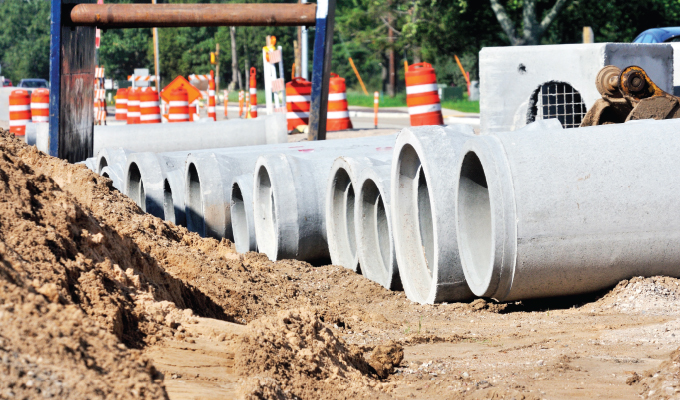By Nick Francia
More than one year has passed and the effects of the coronavirus still continue to impact businesses of all industries and sizes across the country and throughout the globe. Last February, indicators economically seemed stable with positive business and consumer sentiment. The entire world was then hit with a pandemic that changed the way everyone, including construction companies, did business.
IMPACT OF COVID-19
The COVID-19 pandemic has placed many general contractors in the construction industry into one of the most challenging times in their company’s history. For many construction companies, COVID-19 has meant higher material costs, material delays, and supply shortages. Inevitably, this has negatively impacted a contractor’s ability to maintain an existing schedule or stay within budget, and has resulted in slower project completions. The pandemic has also meant that financing has dried up for new jobs and owners have had table current projects until the pandemic completely passes—or the uncertainty becomes clearer.
Construction companies across the world and in the U.S. have had to consider how they will react to an outbreak near one of their jobsites or offices. Positive cases and outbreaks have led to stopping work and projects temporarily and even complete terminations of projects because the area where the work was being done was deemed too risky for other employees. All these challenges have led many construction firms to make the tough decisions of laying off their workers or furloughing its employees.
What lies ahead for general construction contractors remains unclear. No matter the situation the industry and business is in, below are steps contractors can take to help their business survive throughout the pandemic.
1. ENSURE THAT THE COMPANY’S LOAN IS CURRENT
If the company has a business loan, it is essential that it is kept current. Keeping the company’s loan current may end up making an important difference for general contractors applying for access to relief lending programs.
2. UNDERSTAND THE ORGANIZATION’S CASH FLOW
Now, more than ever, it’s important to understand the company’s cash flow. Analyze what lines of credit and lending options the organization has available as well as what opportunities the company has to take advantage of applicable business insurance.
3. PRIORITIZE EXECUTION AND PLANNING
Contractors must continue focusing on execution and planning. The first priority needs to be successfully operating the business over the next several months. Also, focus on implementing business continuity plans to safeguard the company’s employees and stakeholders. Do everything that needs to be done to ensure there is limited disruption to the business operations.
4. REFORECASTING BUDGETS
Analyzing short-term budgets and long-term financial plans takes precedence now. Instead of reforecasting these budgets every so often, look at these regularly, maybe even as often as weekly. When looking through these budgets, understand any possible liquidity constraints that the business may have moving forward. Take any necessary measures to tighten up financing in the event that this pandemic leads to an even more drawn-out economic downturn.
5. CYBER SECURITY IS KEY IN THESE TIMES
When employees are not in the field, they may be working at an exclusive remote working environment. With this working situation, it’s important that every employee remembers items like cyber and data security, including the actions of employees’ spouses and children if they have access to the company’s network. Threats to cyber security should be taken seriously.
6. LEVERAGE TECHNOLOGY, SMARTLY
With the proper safeguards in place, contractors should use technology to their advantage. Given the new realities this pandemic has created, business owners should throw out old patterns and use assets that can be helpful to them and their employees moving forward.
7. CONSIDER UTILIZING AN EMPLOYEE STOCK OWNERSHIP PLAN (ESOP)
Construction companies are well-positioned for employee ownership, and ESOPs are particularly popular in this industry. If you’re looking for a way to diversify your net worth, extract liquidity from the business, and reward your employees, a partial ESOP could serve as a powerful tool. By selling a minority stake of your company to an ESOP, you can achieve these goals while also enjoying significant tax benefits.
CLOSING THOUGHT
The appropriate course of action for each construction company is complex, but your team will be measured on how you navigate this chaotic environment. For years to come, potential investors will be evaluating operational and financial performance of businesses during this period in order to measure the cyclicality and overall resilience/risk profile of a business. The management team will also be measured on how you navigate this environment. If possible, it is encouraged that you track any coronavirus related impacts on your business, like contract delays, overtime costs, sick leave, supply disruptions, increased transportation costs, etc.
About The Author
As managing director for The Capital ESOP Group at UBS Financial Services, Nick Francia has more than 10 years of experience as a wealth management advisor and works with business owners in developing tax-efficient exit strategies, including employee stock ownership plans. He can be reached at Nick.Francia@ubs.com. This article was written and provided by UBS Financial Services Inc. for use by its Financial Advisors. UBS Financial Services Inc. and its affiliates do not provide legal or tax advice. Clients should consult with their legal and tax advisors regarding their personal circumstances.
Modern Contractor Solutions, April 2021
Did you enjoy this article?
Subscribe to the FREE Digital Edition of Modern Contractor Solutions magazine.



